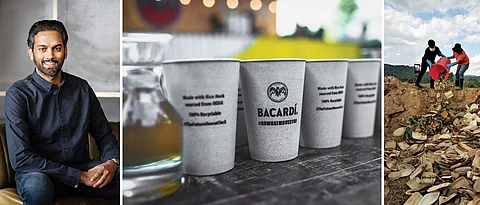

Bacardi Weekender is popularly known as ‘the happiest music festival’. But for a while now, their aim has to be the most sustainable and eco-friendly one too. With the motto of ‘reduce, reuse and recycle’, the festival has been encouraging visitors to care for the planet by reducing waste. This year, Bacardi has launched a campaign titled Future Doesn’t Suck to reduce the use of plastic from their events as much as they can. Rohith Reddy, marketing director, Bacardi Pvt Ltd, Asia, Middle East and Africa, who is leading the sustainability initiative, talks about replacing all plastic glasses at the festival with reusable rice husk glasses.
Tell us more about how you made the decision to introduce rice crop waste glasses?
We at Bacardi have an ambitious goal to incorporate more sustainable initiatives within our business – an objective that has been brought to life globally through our Good Spirited campaign. We are constantly striving to find innovative ways to address environmental impact, such as single-use plastics and even air quality – a serious issue facing India.
We began our sustainability journey with the launch of our Future Doesn’t Suck initiative, a movement we are driving with Lonely Whale to remove one billion plastic straws by 2020.
This year, we are taking our sustainability efforts one step further with the creation of our bio-based, recyclable and reusable rice husk glasses.
We have invested in spearheading the innovation and creation of the glasses and are committed to continuing to find sustainable solutions within our business.
What makes this a good idea?
Rice husk is a form of agricultural waste, which is often burned at the end of the crop season. The rice husk we use to produce these glasses is sourced from farmers in India, offering not just a solution to single-plastic cup usage, but also an alternative to crop waste burning.
The rice husk glasses are bio-based, recyclable and reusable and our investment in research and development has found that this product has the lowest carbon footprint compared to any other alternative.
How are these glasses made?
The glasses are produced in India and are made using a combination of rice husk, vegetable-based oil and reusable and recyclable food-grade polystyrene.
Are these glasses more expensive/cheaper than the plastic glasses?
The rice husk glasses are a first-of-its-kind innovation spearheaded by Bacardi. The design and technology used to convert the rice husk into a material sturdy enough to hold liquids does make it more expensive to produce than regular glasses, but we believe it is worth the investment.
What will happen to all the used rice crop waste glasses after the festival? How will they be collected and disposed?
Our goal is to encourage festival guests to reuse their rice husk cups throughout their time at the festival – and if possible, to take them home and continue using them! To reduce the use of cups, we have incentivised drinks by Rs 50 if guests reuse their glasses.
This policy was introduced last year and has been extremely effective, reducing cup usage at the festival by more than 70 per cent.
We have also instituted a ‘Leave no Trace’ policy at BACARDÍ NH7 Weekender to ensure that all waste is adequately divided into biodegradable, recyclable, polyfuel and landfill categories daily before sending for disposal.
Measures to segregate waste begin at the consumer level during the festival, and separate bins for various types of waste have been placed throughout the grounds, along with signage directing guests on how to use them.
Where are these glasses sourced from?
We’re proud to say that the glasses have been ideated, designed and created in India with indigenously sourced materials. They are produced at a manufacturing unit in Maharashtra.
How do you ensure that the glasses are hygienic?
The glasses are food-grade compliant, making them safe for food and beverage consumption.
Are they sturdy enough to hold water/liquids for some time? Will you also be serving alcohol/soda in these glasses?
Yes, the glasses are sturdy, reusable, recyclable and suited for different liquids. We’ve tested the glasses with different Bacardi products and aerated drinks and can confidently say that all of these liquids can be served in them.
Will it change the taste of the beverage in any way?
No, the glasses will not alter the flavours or taste of any liquid or water.
What other measures are you taking to make the festival as eco-friendly as possible?
